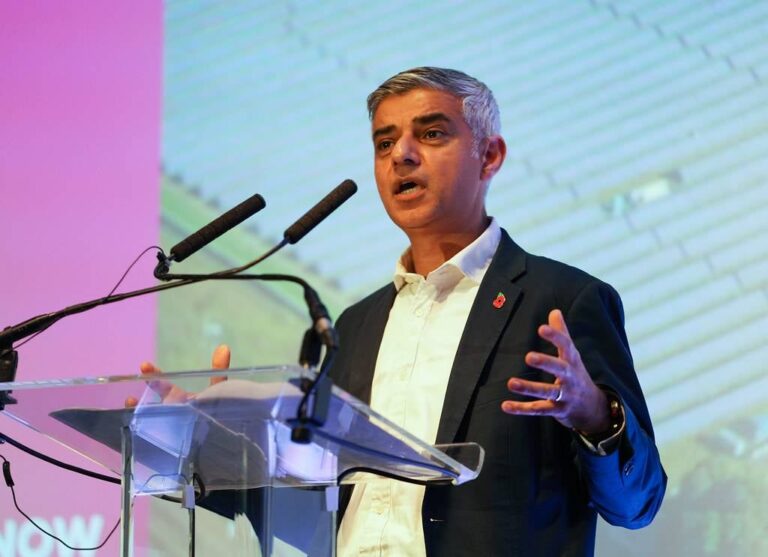South By South West, or SXSW, the annual festival of technology and the arts, launched its London edition this week. Since Monday, attendees in Shoreditch have heard from Google DeepMind CEO Demis Hassabis and UK political figures Sadiq Khan and Tony Blair on the future of artificial intelligence.
London mayor made his case for capital being AI ‘global centre’
Khan, London’s mayor, opened the inaugural event by expressing his desire to make the capital a “global centre” for AI innovation, citing that 3,100 AI companies are currently operating in the city, according to Variety. He added that emerging technologies should “be shaped by (London) values… and ensure the moral dimension in any new tech is given equal weight to market considerations.”
Despite Khan’s ambitions, the UK is not currently a global front-runner in AI. In 2024, the number of newly launched tech startups in the country experienced its first “marked decline”. The UK ranks third globally in the world for AI readiness, according to Stanford University research, trailing significantly behind the US and China.
The UK government has shifted its stance on AI policy from risk-averse to pro-innovation, aiming to attract the tech giants that don’t want their growth potential limited by legislation. In January, Prime Minister Keir Starmer released the AI Opportunities Action Plan, which put innovation front and centre and made little mention of AI safety. He also skipped the Paris AI Summit, where the UK declined to sign a global pledge for “inclusive and sustainable” AI, as did the US.
Last month, Chi Onwurah, the head of the UK’s tech select committee, warned that the AI Safety Bill, which would introduce binding safeguards on advanced AI systems, is at risk of being pushed aside. She also cautioned that the delay may reflect political efforts to align more closely with the United States, where President Donald Trump’s camp has been openly hostile to AI regulation efforts.
Khan used his time on the stage to position London as “resolutely pro-business, pro-growth and pro-freedom of expression” amid a time of “uncertainty and political turmoil,” taking a swipe at Trump’s erratic tariff policies. The UK is currently the only country that has made a deal with the US, meaning exports will remain subject to a 10% baseline tariff when they come into effect in early July.
Former Prime Minister encouraged embracing AI doctors and teachers
The UK’s former prime minister made a surprise appearance at SXSW London to speak about AI. “I think we’re in the foothills of the most transformative revolution since the Industrial Revolution of the 19th century,” Sir Tony Blair said, according to LBC.
He emphasised that the tech should be ingrained into public services, giving us AI nurses, doctors, and tutors. “We are already doing a lot of imaging much, much better through using artificial intelligence,” he said, according to LBC. “It will make (the government) much smaller, more efficient, cost less and give a better service to the customer.”
“It’s absurd we haven’t yet put all of our NHS data there, available to be used for innovation.” Policy analysts have raised concerns that a government proposal to ban AI training on copyrighted material, which would include academic research, could hinder scientific progress in areas such as healthcare that offer significant societal benefits.
SEE: OpenAI and Google Reject UK Government’s AI Copyright Proposal
Sir Blair also emphasised that AI should be integrated into the civil service to enhance government efficiency, as was pledged in January to achieve £45 billion in annual productivity savings.
He said, per LBC: “Government’s all about process, so you could use AI to speed up the process of the government, making sure that we do, for example, all the routine jobs of government much more efficiently. You could be responding to people in a much more sensitive, faster, better, more efficient way.”
Google DeepMind CEO said AI needs international cooperation
Demis Hassabis, the chief executive officer of Google’s AI research arm DeepMind, agreed with Sir Blair in that he thought that artificial general intelligence, which matches that of humans, will be “bigger” than the Industrial Revolution in terms of societal impact, according to CNBC. However, he warned that the pace of AI development requires international cooperation, which he noted is difficult in today’s geopolitical climate.
“Many, many countries are involved in researching or building data centres or hosting these technologies. So I think for anything to be meaningful, there has to be some sort of international cooperation or collaboration, and unfortunately, that’s looking quite difficult in today’s geopolitical context,” he said, per AFP. Indeed, this could be another jab at the US and its more combative approach to tech governance.
Hassabis said that the cooperation is also necessary because “the technology is across all borders,” so any regulation “needs to kind of adapt to where the technology ends up going and what the problems end up being,” according to AFP. He wants to avoid both sweeping regulation that could stifle innovation and a patchwork of rules that would be difficult and costly for tech companies to navigate. For example, if one jurisdiction banned the use of copyrighted material to train AI while another allowed it, a company trying to launch in both could be forced to retrain or limit its models.
SEE: IT Leader’s Guide to Artificial General Intelligence from TechRepublic Premium
While 58 countries advocated for internal alignment at the Paris AI Summit in February, US Vice President JD Vance disparaged Europe’s use of “excessive regulation.” Meta and other tech companies, as well as prominent economists, have deemed regulation across Member States as “inconsistent” and thus prohibitive, holding the region back.
Europe remains a key market for large tech companies, and many industry leaders resist proposals that could restrict access or raise compliance costs. While civil society groups support strict rules to ensure consumer safety, others contend that current regulations fail to go far enough.

